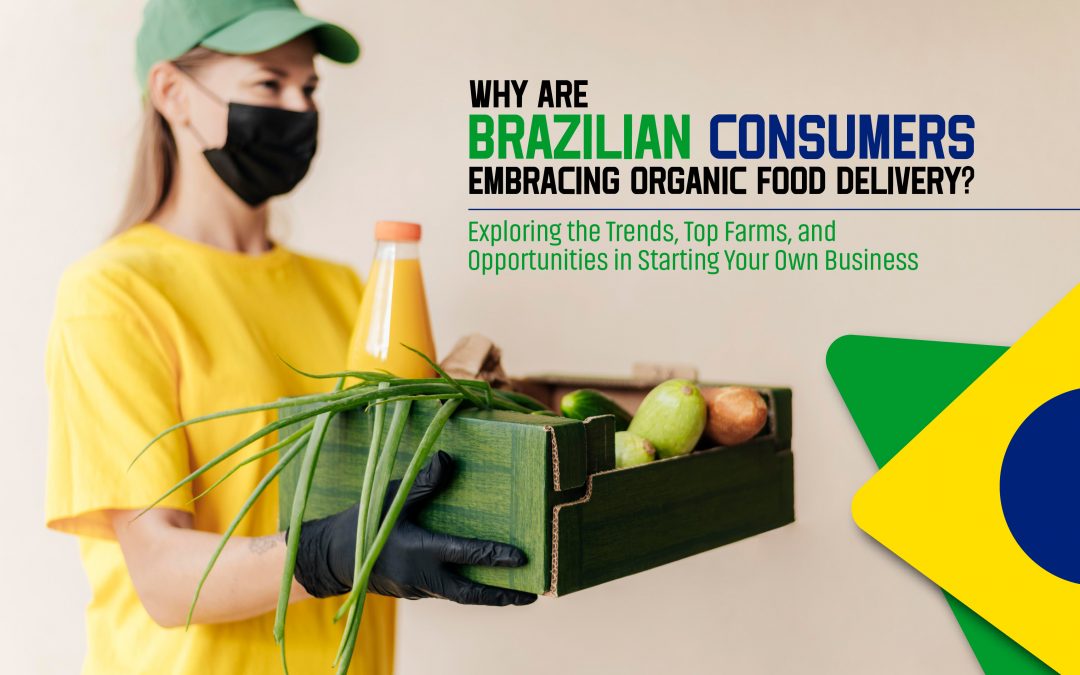The organic food industry in Brazil is experiencing a significant transformation, with more consumers than ever turning to organic food delivery services. This shift is driven by a combination of health consciousness, environmental awareness, and the convenience that these services offer. In this blog, we’ll explore why Brazilian consumers are embracing organic food delivery, the trends shaping this industry, the top organic farms partnering with delivery services, and why now is the perfect time to start your own organic food delivery business in Brazil.
The Rise of Organic Food Delivery Services in Brazil: Trends and Opportunities
Over the past decade, there has been a noticeable rise in the demand for organic food in Brazil. Consumers are increasingly aware of the benefits of organic produce, such as the absence of synthetic pesticides, genetically modified organisms (GMOs), and other harmful chemicals. This demand has fueled the growth of organic food delivery services, offering Brazilians easy access to fresh, healthy, and environmentally friendly food options.
Several trends are contributing to this rise:
- Health and Wellness Movement: Brazilians are prioritizing their health, leading to a surge in demand for organic food. With the growing awareness of the link between diet and health, organic food is seen as a healthier alternative to conventional produce.
- Environmental Consciousness: The environmental impact of conventional farming practices has led many consumers to seek out more sustainable options. Organic farming, which emphasizes soil health, biodiversity, and reduced carbon emissions, aligns with these values.
- Convenience of Delivery Services: In today’s fast-paced world, convenience is key. Organic food delivery services offer consumers the ease of having fresh, organic produce delivered directly to their doorsteps, saving time and effort.
Trend Analysis:
- Market Growth: The organic food market in Brazil has been growing rapidly. According to a 2023 report by Nielsen, the organic food segment in Brazil saw a growth of approximately 15% annually from 2018 to 2023. This growth is driven by increasing consumer awareness about health and sustainability.
- Consumer Preferences: A survey by the Brazilian Institute of Geography and Statistics (IBGE) in 2023 found that 30% of Brazilian consumers are willing to pay a premium for organic products. This reflects a shift towards more health-conscious and environmentally responsible consumer behavior.
- Delivery Convenience: The convenience of home delivery services has become a major factor. A 2022 study by McKinsey & Company revealed that 60% of Brazilians prefer online shopping for groceries, including organic products, due to convenience and time-saving benefits.
- Technological Advancements: The rise of e-commerce platforms and mobile apps has made it easier for consumers to access organic food delivery services. The penetration of smartphones in Brazil reached 85% in 2023, according to Statista, facilitating the growth of online grocery delivery.
Top Organic Farms in Brazil That Partner with Delivery Services
The success of organic food delivery services in Brazil is closely linked to the quality of produce provided by local organic farms. Here are some of the top organic farms in Brazil that partner with delivery services:
- Sitio A Boa Terra: Located in São Paulo, this farm is known for its wide range of organic vegetables, fruits, and herbs. They partner with several delivery services, ensuring that their high-quality produce reaches consumers across the state.
- Fazenda da Toca: Situated in the São Paulo countryside, Fazenda da Toca is one of Brazil’s largest organic farms. They focus on regenerative agriculture practices and supply organic dairy, eggs, and produce to various delivery services.
- Sitio Catavento: This farm in Minas Gerais offers a diverse selection of organic fruits and vegetables. Their commitment to sustainable farming has made them a preferred partner for organic food delivery services in the region.
These farms play a crucial role in the organic food supply chain, ensuring that consumers receive the freshest and most nutritious products.
Organic vs. Conventional: Why Brazilian Consumers are Switching to Organic Food Delivery
The debate between organic and conventional food is ongoing, but a growing number of Brazilian consumers are making the switch to organic. Here’s why:
- Health Benefits:
Organic Food: Free from synthetic pesticides and GMOs. A 2022 study published in the Journal of Nutrition found that organic fruits and vegetables have 20% higher antioxidant levels compared to conventional produce.
Conventional Food: Often treated with chemicals that can be harmful in the long run.
- Environmental Impact:
Organic Farming: Utilizes sustainable practices such as crop rotation and reduced chemical usage. The Environmental Working Group (EWG) reports that organic farming reduces the risk of soil erosion and promotes biodiversity.
Conventional Farming: Associated with higher levels of chemical runoff and soil degradation.
- Taste and Quality: Many consumers believe that organic food tastes better and is of higher quality than conventionally grown produce.
- Supporting Local Farmers: By choosing organic, consumers are often supporting small, local farms that prioritize ethical and sustainable farming practices.
- Transparency: Organic certification provides consumers with assurance that their food meets strict environmental and health standards.
- Consumer Shift:
A 2023 survey by Statista revealed that 40% of Brazilian consumers prefer organic food due to concerns about pesticide residues and environmental sustainability.
These factors have led to a significant increase in the number of Brazilians opting for organic food delivery services.
Top 10 Reasons to Choose Organic Food Delivery in Brazil
If you’re still on the fence about switching to organic food delivery, here are the top 10 reasons why you should make the change:
- Healthier Food Choices: Organic foods are free from synthetic additives, providing you with a cleaner, healthier diet.
- Environmental Sustainability: Supporting organic farming helps reduce your carbon footprint and protect the environment.
- Convenience: Enjoy the ease of having fresh, organic food delivered directly to your home.
- Support Local Agriculture: Organic food delivery services often source from local farms, boosting the local economy.
- Better Taste: Many people find that organic produce has a superior taste compared to conventional food.
- Transparency and Trust: Organic certification ensures that the food you eat is held to high standards.
- Improved Nutritional Value: Organic food often has higher levels of essential nutrients compared to non-organic options.
- Promote Animal Welfare: Organic farming practices tend to be more humane and animal-friendly.
- Chemical-Free Food: Avoid harmful chemicals and pesticides by choosing organic.
- Peace of Mind: Knowing that your food is organic gives you confidence in what you’re eating.
Start an Organic Food Delivery Business in Brazil
Steps and Opportunities:
- Market Research:
- Demand Analysis: Use data from sources like IBGE and Nielsen to understand consumer preferences and market size.
- Competitive Landscape: Analyze competitors’ strengths and weaknesses.
- Source High-Quality Organic Produce:
- Partnerships: Collaborate with reputable farms such as Sitio A Boa Terra and Fazenda da Toca.
- Certification: Ensure that all products are certified organic.
- Develop a Business Plan:
- Goals and Strategy: Define your business objectives, target market, and financial plan.
- Budgeting: Estimate startup costs and projected revenue. According to a 2023 report by Business Insider, initial investment in a food delivery business can range from $50,000 to $200,000, depending on scale and location.
- Create a Strong Brand:
- Brand Identity: Develop a compelling brand that resonates with health-conscious and eco-aware consumers.
- Marketing: Utilize digital marketing strategies, including social media and SEO.
- Leverage Technology:
- E-commerce Platforms: Use platforms like Shopify or WooCommerce to manage online orders.
- Mobile Apps: Develop an app for seamless ordering and delivery tracking.
- Focus on Customer Experience:
- Service Quality: Ensure prompt and reliable delivery services.
- Customer Feedback: Implement a system for collecting and acting on customer feedback.
- Promote Your Business:
- Digital Marketing: Use targeted ads and content marketing to reach potential customers.
- Local Partnerships: Collaborate with local influencers and health bloggers to increase visibility.
Statistics: The global organic food delivery market is projected to grow at a CAGR of 13.5% from 2024 to 2030, according to Grand View Research. Brazil, with its growing consumer base and increasing demand for organic products, presents a significant opportunity for new entrants in this market.
Starting an organic food delivery business in Brazil offers a unique opportunity to tap into a growing market while making a positive impact on health and the environment.
Conclusion
Brazilian consumers are increasingly embracing organic food delivery due to its health benefits, environmental impact, and convenience. With the rise of this trend, supported by top organic farms and a shift away from conventional food, there’s never been a better time to explore opportunities in this thriving industry. Whether you’re a consumer looking to make healthier choices or an entrepreneur ready to start your own business, the organic food delivery market in Brazil holds immense potential.













